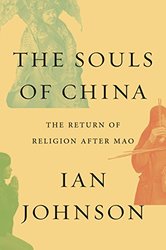 Our friends at The Gospel Coalition recently asked me to review Ian Johnson’s book The Souls of China: The Return of Religion after Mao. Last week, it was published under the title "China’s God-Shaped Vacuum." Here is the opening:
Our friends at The Gospel Coalition recently asked me to review Ian Johnson’s book The Souls of China: The Return of Religion after Mao. Last week, it was published under the title "China’s God-Shaped Vacuum." Here is the opening:
A favorite photo from my early years in China was taken at a Taoist temple in Henan province in 1984. I snapped the photo of an old Taoist priest, perhaps recently released from prison, burning incense. I didn’t know it at the time, but I was witnessing the beginning of the religious revival that Ian Johnson writes about in his wonderful new book, The Souls of China: The Return of Religion after Mao.
Johnson—a Pulitzer Prize-winning journalist and regular contributor to The New York Review of Books and The New York Times—spent six years traveling around China learning about Buddhist, Taoist, and Protestant communities of faith. He tells their stories, and out of these stories emerge several themes that help us better understand religion in China today.
Writing about the complexity of religion in China, I make this point:
The role of religion in China can be confusing, especially for Westerners who often see the world in black and white. The complexity Johnson describes includes a Taoist priest who travels the world, and the pastor of a public and thriving “underground” church. We see an officially atheist government that embraces and promotes traditional values, most of which are rooted in traditional religious beliefs. The government jettisoned one set of moral standards (Confucianism) for another (Marxism-Leninism-Mao Zedong thought), then jettisoned that one without replacing it with anything other than economic development, creating a moral and spiritual vacuum. Now, instead of trying to smash religious belief, the party is trying to co-opt it by focusing on traditional values.
By introducing us to Early Rain Church and its pastor Wang Yi, Johnson provides a fascinating glimpse into the inner workings of a large, unregistered urban church that, like thousands of churches around China, is “not permitted but not banned.” How can an “underground church” be public? How can an “illegal” church be “free”? Anyone seeking to understand religion in China must grapple with this complexity.
You can read the entire review here.
If you want to hear Johnson talk in-depth about the book, here is a list of links to all the interviews that Johnson has participated in.
Finally, here is a short video introduction to the book:

Joann Pittman
Joann Pittman is Vice President of Partnership and China Engagement and editor of ZGBriefs. Prior to joining ChinaSource, Joann spent 28 years working in China, as an English teacher, language student, program director, and cross-cultural trainer for organizations and businesses engaged in China. She has also taught Chinese at the University …View Full Bio
Are you enjoying a cup of good coffee or fragrant tea while reading the latest ChinaSource post? Consider donating the cost of that “cuppa” to support our content so we can continue to serve you with the latest on Christianity in China.